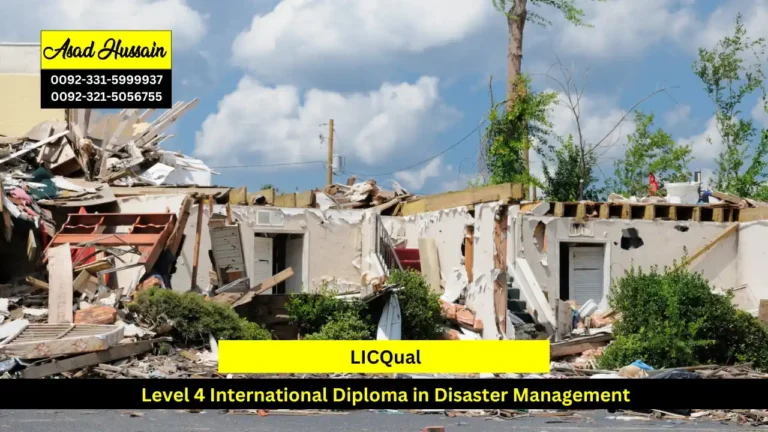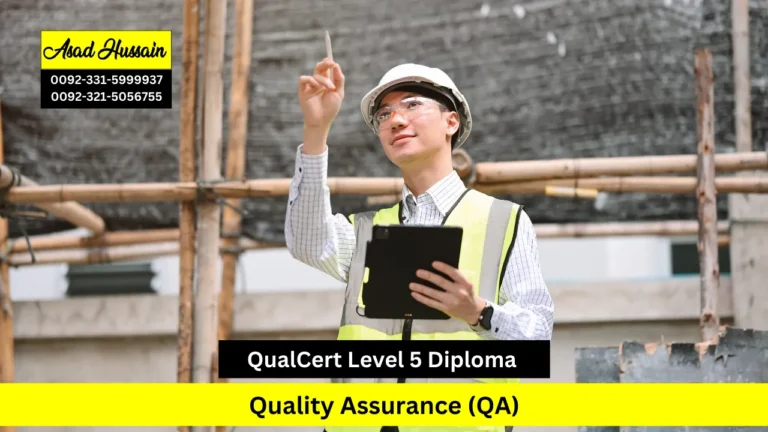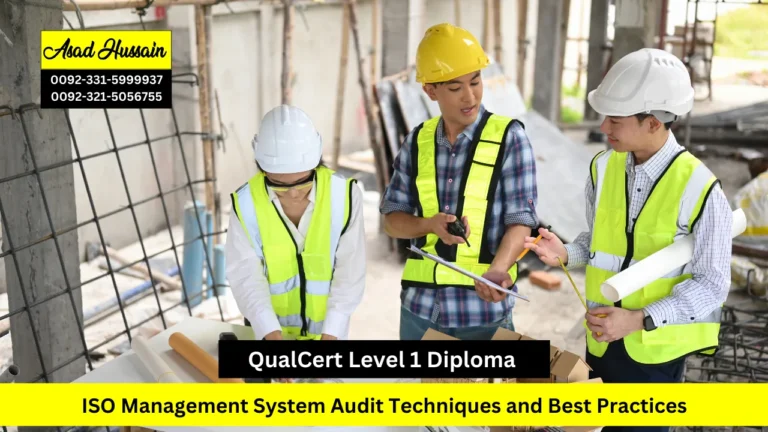In today’s civil engineering and construction industry, ensuring project quality, safety, and compliance is critical for sustainable infrastructure development. The QualCert Level 5 Diploma in Quality Control (QC) Civil is designed to equip professionals and aspiring civil engineers with the knowledge and practical skills needed to manage quality control processes effectively across a variety of construction projects. This program provides a solid foundation in advanced QC principles, inspection techniques, and regulatory compliance.
The QualCert Level 5 Diploma in Quality Control (QC) Civil covers essential topics including strategic quality management, materials testing, risk assessment, and documentation procedures. Learners will gain the ability to evaluate construction processes, identify potential quality issues, and implement corrective actions to ensure project standards are met. Emphasis is placed on both theoretical understanding and practical application, preparing participants to perform QC inspections, analyze results, and contribute to overall project efficiency and safety.
Participants will also develop skills in reporting, communication, and compliance auditing, enabling them to coordinate effectively with teams and stakeholders. The diploma introduces learners to best practices in civil engineering quality control, preparing them to adopt modern techniques and tools that enhance construction quality and sustainability.
Upon completion, graduates of the QualCert Level 5 Diploma in Quality Control (QC) Civil will be fully prepared to take on supervisory roles in quality assurance, construction inspection, and project management. This diploma provides a strong pathway for career advancement in civil engineering and related disciplines, equipping learners with internationally recognized skills and expertise in construction quality management.
Program Highlights
Mandatory Units
- Advanced QC Management and Leadership
- Root Cause Analysis and Process Improvement
- Construction Risk Assessment and Mitigation
- Cost-Benefit Analysis in Quality Control
- Advanced Material Science in Civil Engineering
- Research and Innovation in QC
The diploma is an intermediate-level program aimed at civil engineering professionals and advanced learners seeking to enhance their expertise in quality control, inspection, and project management. The following entry requirements ensure candidates are well-prepared for the course.
Age Requirements
- Minimum age of 18 years at the time of enrollment.
- Suitable for early-career professionals and mature learners seeking career advancement.
Educational Requirements
- Completion of a Level 4 Diploma or equivalent in civil engineering, construction, or quality control.
- A foundation in construction principles, materials, and inspection techniques is preferred.
Professional Experience
- Recommended 1–3 years of work experience in civil engineering, construction, or quality control.
- Experience in inspections, materials testing, or project support is advantageous.
English Language Proficiency
- Ensures effective communication during tutorials, assessments, and practical exercises.
- Necessary for understanding technical documentation and reporting QC findings.
The QualCert Level 5 Diploma in Quality Control (QC) Civil is designed to equip learners with advanced knowledge, practical skills, and analytical expertise required to manage quality control in civil engineering projects effectively. This program prepares learners to lead QC initiatives, conduct in-depth assessments, and implement innovative solutions for construction quality and compliance.
1. Advanced QC Management and Leadership
- Apply leadership principles to manage quality control teams in civil engineering projects.
- Develop and implement strategic QC plans aligned with organizational objectives.
- Monitor project performance using KPIs and quality metrics.
- Coordinate resources and personnel to ensure consistent QC standards.
- Enhance decision-making for complex project quality challenges.
2. Root Cause Analysis and Process Improvement
- Identify underlying causes of quality issues in construction processes.
- Implement corrective and preventive actions to improve project outcomes.
- Utilize process improvement methodologies such as Lean and Six Sigma.
- Document and communicate findings to support organizational learning.
- Evaluate the effectiveness of implemented quality improvement initiatives.
3. Construction Risk Assessment and Mitigation
- Conduct comprehensive risk assessments for civil engineering projects.
- Develop mitigation strategies to minimize quality and safety risks.
- Integrate risk management practices with QC planning and inspections.
- Monitor and review risk outcomes to ensure project compliance.
- Apply proactive problem-solving techniques to prevent potential failures.
4. Cost-Benefit Analysis in Quality Control
- Assess financial implications of quality control measures and interventions.
- Compare cost and benefits of different QC strategies to optimize project efficiency.
- Make informed decisions regarding resource allocation and QC investments.
- Balance project quality objectives with budgetary constraints.
- Analyze the impact of QC decisions on project sustainability and profitability.
5. Advanced Material Science in Civil Engineering
- Evaluate the properties and performance of construction materials.
- Apply material testing techniques to ensure compliance with standards.
- Understand the behavior of materials under varying environmental and load conditions.
- Integrate material science insights into practical QC applications.
- Recommend material selection strategies to enhance project durability and quality.
6. Research and Innovation in QC
- Conduct research to identify emerging trends and innovative QC techniques.
- Apply evidence-based approaches to enhance quality management processes.
- Develop innovative solutions to complex quality control challenges.
- Document and present research findings in a professional format.
- Integrate innovation into practical QC strategies for real-world civil engineering projects.
Upon completion of the QualCert Level 5 Diploma in Quality Control (QC) Civil, learners will possess advanced technical, analytical, and leadership skills required to manage quality control effectively in civil engineering projects. Graduates will be prepared for supervisory and managerial roles, contributing to safer, higher-quality, and more sustainable construction practices.
The QualCert Level 5 Diploma in Quality Control (QC) Civil is designed for learners seeking to develop advanced technical knowledge, leadership skills, and practical expertise in civil engineering quality control. This program is ideal for professionals and motivated learners aiming to manage construction quality, lead QC teams, and implement innovative solutions in real-world projects. The ideal learner is analytical, proactive, and committed to improving project standards and compliance.
Educational Instructors and Trainers
- Professionals aiming to teach civil engineering quality control principles at advanced levels.
- Trainers seeking updated knowledge in QC methodologies and best practices.
- Educators responsible for developing curriculum aligned with international standards.
- Individuals mentoring students and junior engineers in practical QC applications.
- Those enhancing credibility and authority in construction quality education.
Environmental Advocates and Activists
- Professionals ensuring civil engineering projects comply with environmental and sustainability standards.
- Advocates monitoring QC processes to reduce ecological impact.
- Individuals promoting sustainable construction and responsible material usage.
- Activists seeking technical understanding of QC in civil projects.
- Those aiming to influence environmentally responsible decisions in infrastructure projects.
Research and Development Teams
- Engineers and researchers analyzing innovative QC methods and construction materials.
- Professionals applying analytical techniques to enhance project quality.
- Team members documenting QC performance and compliance outcomes.
- Individuals conducting studies on efficiency, safety, and innovation in civil engineering.
- Those integrating research findings into practical QC applications.
Corporate Social Responsibility (CSR) Professionals
- CSR coordinators ensuring construction projects meet ethical, social, and quality standards.
- Professionals monitoring safety, compliance, and community impact in civil projects.
- Individuals implementing CSR initiatives that promote high-quality and sustainable outcomes.
- Those integrating QC insights into corporate social responsibility strategies.
- Professionals enhancing organizational reputation through safe and responsible construction.
Students and Recent Graduates
- Learners aiming to gain advanced expertise in civil engineering quality control.
- Graduates seeking supervisory or leadership roles in construction QC.
- Individuals developing practical skills in inspection, risk assessment, and compliance.
- Students preparing for research or technical roles in civil engineering.
- Those seeking internationally recognized Level 5 certification to boost career prospects.
Career Changers
- Professionals transitioning into civil engineering, QC, or project management roles.
- Individuals seeking recognized qualifications to validate expertise.
- Career changers aiming to develop strategic, technical, and leadership skills in QC.
- Those seeking supervisory responsibilities in quality management and compliance.
- Learners motivated to apply advanced QC principles in civil projects.
Policy Makers and Regulators
- Government officials and regulators overseeing civil engineering project compliance.
- Professionals seeking knowledge of QC standards for policy implementation.
- Individuals ensuring projects meet safety, quality, and environmental regulations.
- Regulators aiming to enhance monitoring and auditing processes.
- Policy makers applying QC insights to improve infrastructure standards and safety practices.
The QualCert Level 5 Diploma in Quality Control (QC) Civil is ideal for professionals and learners committed to advancing their expertise in civil engineering quality control. Graduates will acquire the technical knowledge, leadership capability, and analytical skills needed to ensure high-quality, safe, and sustainable construction projects.







